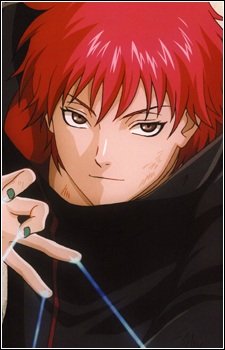Series & First Appearance
Sasori, also known as Sasori of the Red Sand, is a prominent character in the manga and anime series Naruto, created by Masashi Kishimoto. He first appears in Naruto Shippuden Episode 18 and Chapter 276 of the manga.
Profile at a Glance
Sasori is 35 years old at the time of his introduction, though he maintains a youthful appearance through his mastery of puppet creation. As a member of the Akatsuki, he serves as an antagonist and is initially paired with Deidara. His signature abilities include puppet manipulation and the use of human puppets, with his most notable weapon being the Third Kazekage, whom he converted into a puppet.
Personality & Motivations
Sasori possesses a calm, collected demeanor, often conveying a sense of superiority and detachment. He is deeply affected by his childhood experiences, particularly the loss of his parents, which drives his obsession with dolls and puppetry as substitutes for real connections. His ultimate goal is to create a world free from pain and suffering, reflecting his disillusionment with human emotions. Notable quirks include his emotional detachment and his disdain for the concept of true emotions, which he believes lead to suffering.
Abilities / Powers
Sasori is a master puppeteer, capable of controlling numerous puppets in combat. His unique style includes the use of human puppets, allowing him to access the abilities of the deceased, including the revered Third Kazekage. He created over 100 puppets and possesses a notable arsenal, including his most lethal creation, the "Hiruko," which serves as both a weapon and a shield. Sasori also houses his heart, the last remnant of his humanity, within a container in his chest, making it his singular vulnerability. His abilities evolve throughout the series, showcasing increased strategic combat skills and mastery over puppet techniques.
Major Story Arcs & Growth
Sasori plays a significant role during the "Sasori Arc" in Naruto Shippuden, where he confronts Sakura Haruno and Chiyo, his grandmother, in a pivotal battle to reclaim the stolen Shukaku. This clash emphasizes his philosophical beliefs about emotions and connections while allowing for character revelations and growth. His eventual defeat represents a crucial moment in the series, illustrating the tragic end of one of the many broken souls in the Ninja World.
Notable Relationships
Sasori has several key relationships that define his character arc. His grandmother, Chiyo, significantly impacts his life by introducing him to puppetry, becoming both a mentor and a rival later in the series. Sasori’s partnership with Deidara introduces a complex dynamic, with underlying tension and rivalry stemming from past influences. His former partnership with Orochimaru illustrates the respect they held for each other’s abilities, despite Sasori’s eventual jealousy as Orochimaru leaves Akatsuki.
Iconic Moments & Quotes
One of Sasori’s most memorable moments occurs during his battle with Chiyo and Sakura in Naruto Shippuden Episode 20, where he expresses his disdain for human emotions while revealing his tragic backstory. His quote, “I have long since abandoned the flesh… to me, puppets are a more reliable companion,” encapsulates his philosophy and resonates with fans, highlighting his emotional detachment.
Trivia & Behind-the-Scenes
Sasori is voiced by Akio Ohtsuka in the Japanese version while in the English dub his voice is provided by Chris Sabat, known for his performances in various anime series. Sasori ranked favorably in various popularity polls, often celebrated for his unique design and tragic backstory. His character design features multiple references to traditional puppetry, emphasizing the blend of artistry and combat skills that define his persona.
His distinct manipulation of human emotions serves as a stark contrast to other characters in the series, thus fostering rich thematic exploration regarding love, loss, and transformation within the narrative. Sasori’s character stands as a poignant reminder of the effects of trauma and the quest for connection in a fragmented world.







